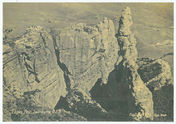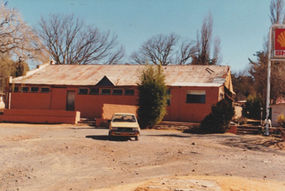Overview
The village of Swinburne is dominated by the landscape of Rensburg's Kop, which is visible for several kilometers on either side of the Kwa-Zulu Natal/Free State border. Swinburne Village was established around the toll bridge, one of the oldest in The Free State, built over The Wilge River in 1892. The buildings of the current Riverview Country Inn and The Hound and Hare Pub and Restaurant were first built as a Coach House during the Gold Rush. The Village consisted of a Police Station, Courthouse, Post Office, Butchery, and Supply Store.
Swinburne gets its name from Sir John Swinburne (1831-1914), the 7th Baronet of Capheaton and Sheriff of Northumberland. He also served in the Burmese war in 1852, in China, and in the Baltic in 1854. In 1885 he was elected Labour MP for Lichfield, Staffordshire, after whom the railway station here was named.
Sir John Swinburne was the principal manager of the London and Limpopo Gold Mining Company. The company had established the first large-scale gold mining operation in Southern Africa in 1869 near Tati on the Botswana/Zimbabwe border.
Sir John Swinburne landed at Port Natal in 1868, he bought five wagons and six teams of trained oxen, loaded the mining equipment, and hastily set course for Tati via Harrismith. He had made great progress through Natal and up Van Reenen's Pass but once summiting the escarpment he had reached the marshy ground of Bosch Hoek, and after a rather wet year, this proved to be difficult for the team and they found themselves stranded with the wagons, axle-deep in the muddy marsh. After a rather long week in the marsh, the oxen were exhausted and they were still stranded. Sir John Swinburne decided to swap the oxen and wagons for a farm called Albertina Farm, on a drift across The Wilge River. He then hired a transport rider to take all his supplies and headed off to Tati. He never returned to Albertina Farm.
In 1892, the Orange Free State received its rail-link from the Natal Railway, a station and toll bridge was built over The Wilge and named Albertina. This did not bode well as there was another station on the Riversdale-Mosselbay line that was named Albertinia. It was then decided a few years later, by the heads of the railway to re-name the station at The Wilge, after the previous owner of the farm, Sir John Swinburne.
In 1906 the farm was bought by Abram Sparks (1866-1939), born in Sydenham, Durban, and the 10th child of David Sparks, who arrived at Port Natal in January 1850. Abram established The Swinburne Store and Sparks Hotel by 1909. Abram's only daughter, Olive Mary Sparks took over the running of the hotel up until her marriage to Alfred John Rawlings in 1929. The running of the hotel was then taken over by Donald David Heywood Sparks, Abram's eldest son who had been farming. Abram built the local Post-Office in the early 1930s. Donald inherited the business upon Abram's death in 1939. From 1947 to 1957, Donald leased the business to his brother Colin and proceeded to build and run the local abattoir and butcher shop. Donald resumed the running of the hotel up until his death in 1963 when the business passed from Sparks ownership.
In 1989 the Swinburne Store, Sparks Hotel, and remainder of Albertina Farm was bought by current owners, Steve and Jennifer Cleverly (sister of Geraldine Johnson, owner of The Little Church, Van Reenen). The Store was converted into The Hound and Hare Pub and Restaurant and all other buildings in the Village were converted into the accommodation of Riverview Country Inn.
References:
-
The N3 Book (Peter Delmar)
-
Steve and Jennifer Cleverly (Owners)
























